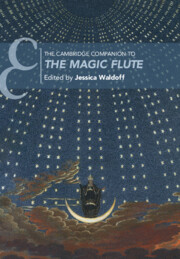Book contents
- The Cambridge Companion to The Magic Flute
- Cambridge Companions to Music
- The Cambridge Companion to The Magic Flute
- Copyright page
- Dedication
- Contents
- Figures
- Tables
- Musical Examples
- Contributors
- Acknowledgments
- Abbreviations
- Introduction
- Part I Conception and Context
- Part II Music, Text, and Action
- Part III Approaches and Perspectives
- 12 Seeking Enlightenment in Mozart’s Magic Flute
- 13 Birdsong and Hieroglyphs: Exoticism and Enlightened Orientalism in The Magic Flute
- 14 Partial Derivatives: Sources, Types, and Tropes in The Magic Flute
- 15 Pamina, the Queen, and the Representation of Women
- 16 Blackness and Whiteness in The Magic Flute: Reflections from Shakespeare Studies
- Part IV Reception, Interpretation, and Influence
- Further Reading
- Index
14 - Partial Derivatives: Sources, Types, and Tropes in The Magic Flute
from Part III - Approaches and Perspectives
Published online by Cambridge University Press: 24 November 2023
- The Cambridge Companion to The Magic Flute
- Cambridge Companions to Music
- The Cambridge Companion to The Magic Flute
- Copyright page
- Dedication
- Contents
- Figures
- Tables
- Musical Examples
- Contributors
- Acknowledgments
- Abbreviations
- Introduction
- Part I Conception and Context
- Part II Music, Text, and Action
- Part III Approaches and Perspectives
- 12 Seeking Enlightenment in Mozart’s Magic Flute
- 13 Birdsong and Hieroglyphs: Exoticism and Enlightened Orientalism in The Magic Flute
- 14 Partial Derivatives: Sources, Types, and Tropes in The Magic Flute
- 15 Pamina, the Queen, and the Representation of Women
- 16 Blackness and Whiteness in The Magic Flute: Reflections from Shakespeare Studies
- Part IV Reception, Interpretation, and Influence
- Further Reading
- Index
Summary
For much of its history The Magic Flute has posed source problems. Some single out literary antecedents drawn from a variety of genres; others emphasize social and cultural influences. To see Mozart’s last opera instead as a synthetic, exploratory work questions whether these different readings are necessarily at odds with each other. As Goethe suggested, the work seems to offer different readings to different audiences. Gernot Gruber has distinguished “causal-historical” readings of the opera, which ground themselves in its cultural-political world, and “metahistorical” ones, which favor the abstract, the mythic, or the universally human. These categories may themselves complement rather than compete with each other.
- Type
- Chapter
- Information
- The Cambridge Companion to The Magic Flute , pp. 221 - 233Publisher: Cambridge University PressPrint publication year: 2023

